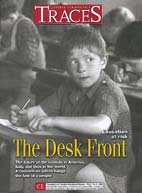
Traces N.3, March 2000
Politics: Education, Freedom, and UnityYou need good reasons, these days, to sustain a commitment to politics. In a moment like this, it is more evident that political action and even an interest in it are directly linked to a question of education: in fact, the purpose of political commitment is so that the individual, each one of us, can acquire increasing self-awareness by living history and in this way can become freer, that is to say, capable of recognizing-and thus of adhering to-the truth, and can be unified, both within him or herself and with others. Education, freedom, and unity are the keys to a serious involvement with reality.
On the contrary, a people whose educational tools, whether direct or indirect, inculcate the idea of belonging only to oneself, of a freedom without reasons, and of a divisiveness in relationships, will have a hard time having a healthy relationship with the political sphere.
As far as Christians are concerned, interest in politics is part of the interest in life and in people to which Christian laymen are educated to be attentive. Passion for true freedom is born of the gaze of exceptional consideration that God turns on human reality, it is born of the gaze of Christ. The laborious but pronounced renewal of the principle of subsidiarity is the assumption of a more adequate and realistic point of view toward society and politics, with this passion as a starting point. The education they have received helps Christians to recognize the most evident attempts at applying a principle which fosters freedom and to indicate the best examples of these attempts in a given historical moment. What politics proposes is not defined by a sought-after hegemony, but takes the value of an example. An attempt.
Those who have long preached a division between personal and church life, between the spiritual and the temporal spheres, between religious practice and political commitment, find themselves today indicating as sole criterion for choice a table of values as vague as it is abstract, malleable as chewing gum, often useful only for hiding quite other motives. They find themselves chasing after the dangerous idea of an all-purpose State, which puts education at risk, reduces freedom of speech and of association, and favors divisiveness and forgetfulness of tradition.
Less we have heard repeated in recent years. We have found fellow travelers who were sincerely passionate, sometimes coming from other points along the political spectrum. Freedom is not helped along by empty chatter, but by facts and personalities.